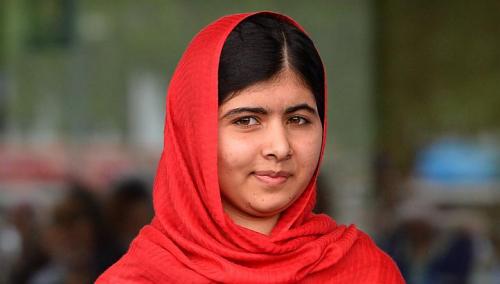Malala Yousafzai, Pakistan’s teenage activist, on Thursday was awarded the European Parliament’s prestigious Sakharov human rights prize.
 “Today, we decided to let the world know that our hope for a better future stands in young people like Malala Yousafzai,” said the chairman of the conservative European People’s Party.
“Today, we decided to let the world know that our hope for a better future stands in young people like Malala Yousafzai,” said the chairman of the conservative European People’s Party.
Malala Yousafzai, the Pakistani schoolgirl campaigner who survived a Taliban murder attempt last year, has become a global icon of the struggle for girls’ education and peace. In her courageous recovery from being shot in the head by aTaliban gunman, the 16-year-old has emerged as a beacon for all those who seek to overcome violence and intolerance with dignity.
She received a standing ovation for an address to the United Nations General Assembly in July in which she vowed she would never be silenced.
Malala has done “nothing” to earn rights prize: Taliban
The Pakistani Taliban Thursday said teenage activist Malala Yousafzai had done “nothing” to deserve a prestigious EU rights award and vowed to try again to kill her.
“She has done nothing. The enemies of Islam are awarding her because she has left Islam and has became secular,” Tehreek-e-Taliban Pakistan (TTP) spokesman Shahidullah Shahid told AFP by telephone from an undisclosed location.
“She is getting awards because she is working against Islam. Her struggle against Islam is the main reason of getting these awards.” He repeated the TTP’s threat — made numerous times in recent months — try again to kill Malala, “even in America or the UK”.
A global icon of girls’ education
Malala first rose to prominence in 2009, aged just 11, with a blog for the BBC Urdu service chronicling life under Taliban rule in Swat, the beautiful valley in northwestern Pakistan where she lived.
In 2007 the Islamist militants had taken over the area, which Malala affectionately called “My Swat”, and imposed a brutal, bloody rule.
Her blog, written anonymously with the clarity and frankness of a child, opened a window for Pakistan onto the miseries being perpetrated within its borders.
Her struggle resonated with tens of thousands of girls denied an education by Islamist militants across northwest Pakistan, where the government has been fighting localTaliban since 2007.
When the army launched an offensive to oust the Taliban, Malala fled Swat with her family led by her father Ziauddin, school principal and himself a seasoned campaigner for education.
After this difficult period she resumed her work promoting education, received the first national peace award from the Pakistani government and was nominated for the International Children’s Peace Prize.
But on October 9 last year the men with guns decided they could no longer tolerate the girl with a book and sent two hitmen to kill Malala on her school bus.
The Pakistani Taliban claimed the attack and warned that any woman who stood up to them would suffer a similar fate.
Incredibly she survived — the bullet grazed her brain and travelled through her neck before lodging in her shoulder — and as she lay fighting for life in hospital, Pakistan and the world united in horror.
Eventually she recovered enough to continue her studies at school in the central city of Birmingham, where her family moved to join her.
HDN















